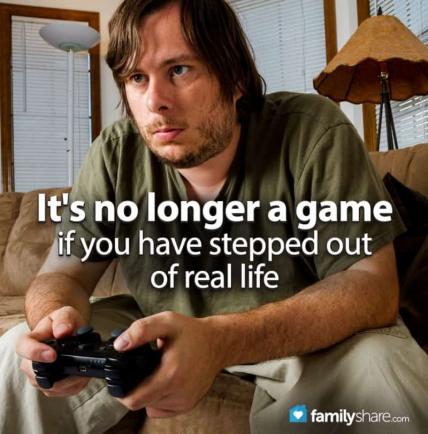
Addiction is a chemical disorder in the brain. Habits and behaviors lower the level of norepinephrine, meaning the person has to work harder to get those levels raised back up. With gaming, the only way to maintain the level of norepinephrine is to play longer, more often, and more intense games. Here are some signs that gaming has become an addiction:
Compulsive play
Taking time out to enjoy a game with friends is one thing, but playing because you physically feel like you have to is compulsion. Playing a little while to relax or have fun is not the same as being upset, or even angry that you have to stop - or being unable to stop.
Impaired function
It's no longer a game if you have stepped out of real life. If you are unable to complete a normal task because it doesn't hold your attention your brain is already changing function. If you are unable to have conversations with those around you, the game has become an illusion of interaction. If you neglect your spouse, children, or work duties because of gaming that is a sign it has gone too far.
Isolating
If you withdraw from other activities because so much time and energy is given to gaming, your playtime may be out of balance. If you only interact with friends online, you will struggle with your ability to engage in real life interactions because entirely different social skills are required.
False achievement
Some players get so lost in levels and other achievements within the game that they lose interest in real life accomplishments. They may become lethargic, unmotivated, or disinterested in pursuing outside interests and hobbies that develop other talents.
Loss of creativity
When video games and high-tech graphics provide the only stimulation, extreme players may lose some of the abilities of their own imagination. Often addicted gamers prefer one game over others, and so repeat only those skills necessary for that game to the exclusion of other skills also needing practice.
Mood swings
Because of changing levels of norepinephrine, the addicted gamer must escalate his addiction in time and intensity to achieve the same positive feelings from gaming. These changes escalate other symptoms, too, including increasing isolation from family and friends and other activities by default. Without these added supports, and with increased intensity from more gaming, the addicted gamer may experience mood swings, or even explosive emotional responses when asked to stop, or confronted about the addictive behavior.
Gaming may be a fun pastime for many, and lots of games include excellent learning opportunities, but when games chosen are more intense or violent, and are played for amounts of time that exclude the player from other interactions and activities, this may fit the pattern for addictive behavior.

